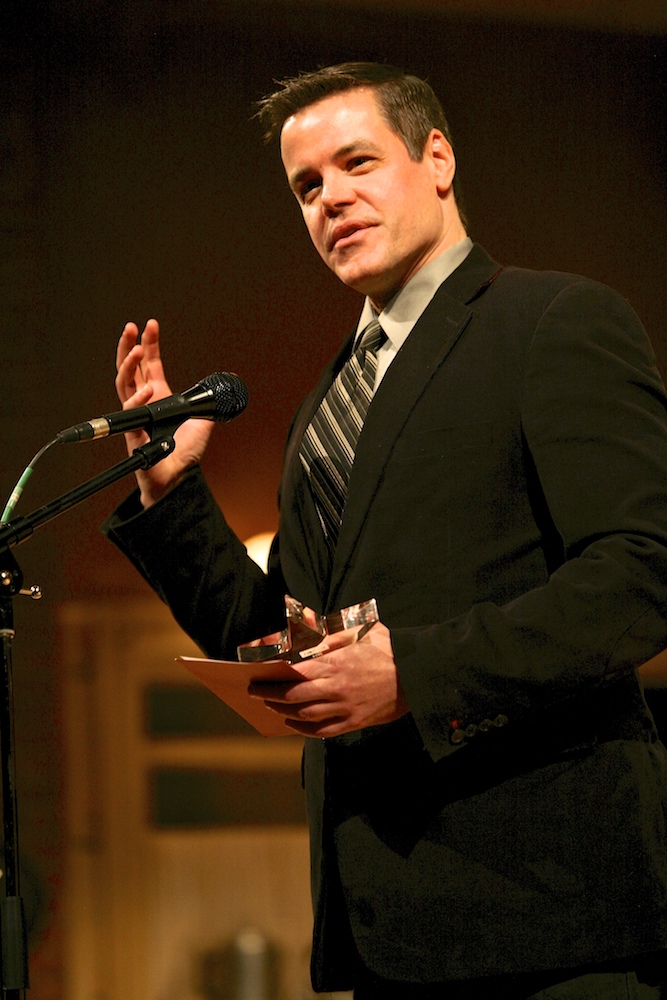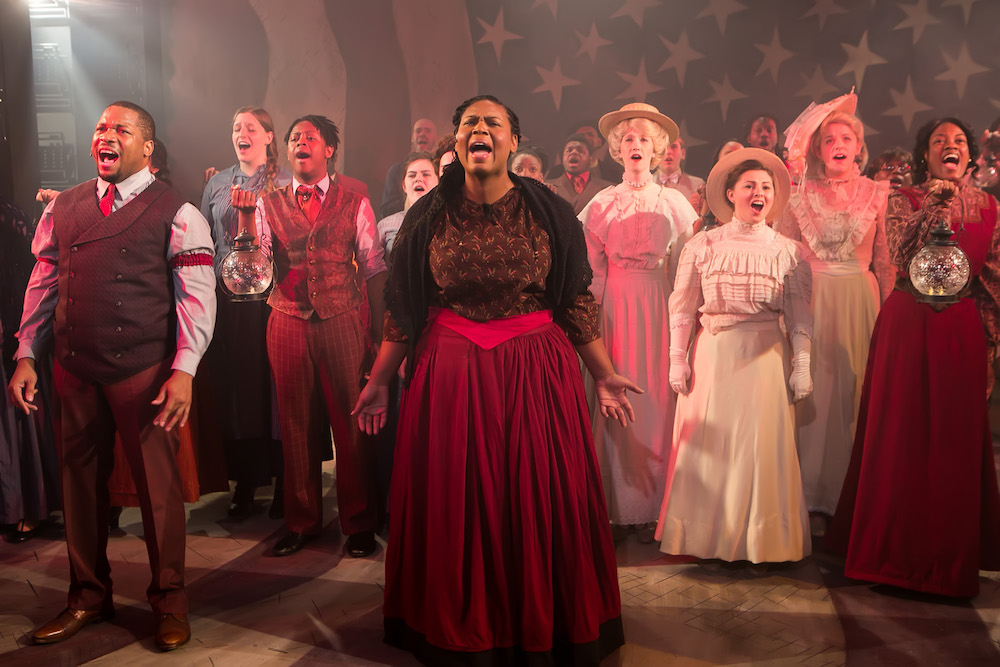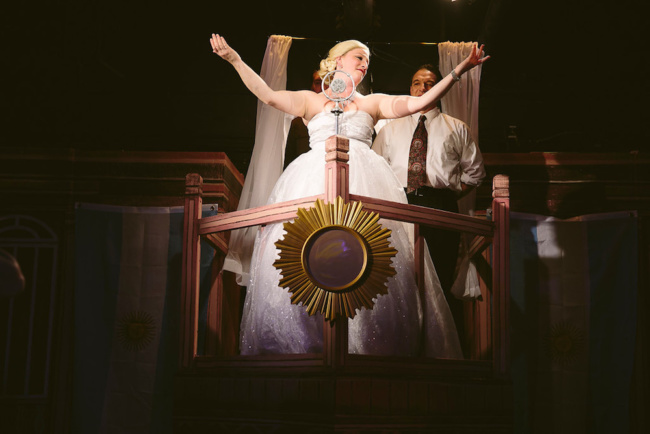Only the fifth artistic director in Syracuse Stage’s 43-year history, Robert M. Hupp arrived in town in late summer and sounded as though he wanted to embrace everything he saw. He settled at Warren Street so he could study local history at the Onondaga Historical Association in every spare moment, and declared that the theater should enhance community. Town and gown can clap hands together.
At his previous gig, Arkansas Repertory, Hupp championed original works and a lively local sense of place. Might we soon see the premiere of a major stage drama on life as it has been known in the Salt City? The Jerry Rescue? The rise and fall of Mayor Lee Alexander?
Hupp inherits the area’s strongest cultural institution, while previous artistic director Tim Bond left a financially healthier organization than the one he found. Returning to the Pacific Northwest, Bond trades Syracuse blizzards for Seattle drizzle as he becomes head of the drama department at the University of Washington.
Across town at the Redhouse Arts Center, the change in artistic regimes was more abrupt, following the unexpected July departure of Stephen Svoboda. His replacement, Joseph C. Walsh, was named in October. He comes with training in Boston and London and has engaged in such cultural adventures as staging the musical Hairspray at the Cork Opera House in Ireland.
Sir Tim Rice showed up in Auburn in June to publicize the Merry-Go-Round Playhouse production of Stuart Brayson’s musicalization of James Jones’ From Here to Eternity. Rice, who turns out to be a champion buff of American pop culture and idiom, wrote the lyrics. A disappointment in its London first-run mounting, Eternity, in director-choreographer Brett Smock’s skilled hands, became one of the company’s most accomplished productions ever.

Cortland Repertory Theatre, a renter at its usual venue, the century-old pavilion at Little York Lake, opened CRT Downtown, a permanent home on the city’s main drag, merging the yardage of a car dealership and a bowling alley. The company now has room to rehearse and a place to store sets and costumes. Not wishing to compete with summer offerings, director Kerby Thompson offered only a few dramas appealing most to niche markets, including Doug Wright’s I Am My Own Wife and arty one-acts by Adam Bock and Conor McPherson.
After a year of transition, Ithaca’s Hangar Theatre appointed Michael Barakiva artistic director. He had found gold in Wendy Wasserstein’s last play, Third, generally passed off elsewhere as a dud. Barakiva had worked with the script as the playwright was dying and knew its strengths that other directors overlooked. Barakiva also had an impressive record with Syracuse Stage, helming the 2011 productions The Turn of the Screw and The Clean House.
Our own Robert Moss, popular former head of Syracuse Stage, and a founder of Playwrights Horizon, has been commemorated off-Broadway. The Robert Moss Theatre can be found at 440 Lafayette St., between Astor Place and the Public Theatre in the heart of the East Village. It seats 68.
The performer with the most spectacular year was Syracuse University Drama Department senior Ezekiel Edmonds, with a long face evocative of 1930s heartthrob Leslie Howard. He was the ironic lead Fredrik in the black box production of A Little Night Music and a chief bully in Punk Rock. When director-choreography Anthony Salatino convinced management to stage his revival of the Yeston-Kopit Nine at the bigger Archbold main stage rather than the Storch stage, there was Edmonds in the lead as Guido, the Fellini character. During the summer he took supporting roles at Cortland Repertory, delivering an uproarious “Officer Krupke” in West Side Story. In the Syracuse Stage yuletide production of Mary Poppins he appeared about every five minutes in some guise or another, once as the honest Cockney Northbrook pleading for a loan.
Along with being a huge hit, Mary Poppins is likely to live on in local lore. In years hence, people will ask, “Did you see that guy dancing upside down in the ceiling?” It was Jonathan Burke as Bert the chimney sweep. Fred Astaire did it with camera trickery in the MGM musical Royal Wedding, but Burke was really hanging upside down.
Peter Amster, one of Syracuse Stage favorite directors, was here twice, second and more spectacularly with Mary Poppins, wringing laughs out of Julian Fellowes’ often stiff dialogue. Earlier he worked to string together Ken Ludwig’s Baskerville: A Sherlock Holmes Mystery. As many audience members had forgotten the anfractuous plot of the novel, Sir Arthur Conan Doyle’s longest, they could not always follow what was happening on stage. Some marble-mouthed accents did not help, either. Did not matter: Amster’s confidence and elan got people laughing anyway.
Timothy Bond’s second-to-last directing assignment at Syracuse Stage was a heartfelt, frequently moving production of Christopher Sergel’s adaptation of Harper Lee’s To Kill a Mockingbird in February. The schedule for the production was set long before we knew of the existence of Lee’s first draft, Go Set a Watchman, published in late 2015, that presents a very different Atticus Finch. Watchman confirmed Malcolm Gladwell’s scathing critique of the novel published in The New Yorker. Despite being well-received locally, Sergel’s Mockingbird might disappear from the boards, to be replaced by a different adaptation.
Bond’s farewell production of Lucas Hnath’s The Christians was an exemplar of the theatrical values he championed for seven years: real-life struggle, in this case intellectual and spiritual. The central argument had implications for everyone in the audience, including the atheists and agnostics.
At the Redhouse, one of director Stephen Svoboda’s finest-ever productions was his last, Ahrens and Flaherty’s Ragtime, with 48 players on stage. As impressive as the out-of-towners were, including baritone Chaz Rose as Coalhouse, some of the top laurels went to local talent: Aubry Ludington Panek as the mother who leaves the nest, with “We Can Never Go Back to Before,” and black-wigged Carmen Viviano-Crafts as the heartless showgirl Evelyn Nesbit in “Crime of the Century.”

The Redhouse also mounted two lushly produced Disney musicals: The Little Mermaid in June, at the end of the Svoboda era, and Beauty and the Beast for the holidays after Walsh had taken over. Mermaid featured Thai-born baritone Napat Mingkwanhuen as the Prince and Julia Goretsky as a vicious black octopus. For Beauty, the appropriately gorgeous Caroline Strang came up from North Carolina to give us a silver-voiced Belle, while familiar face Temar Underwood could have frightened small children as the Beast. Company regular Jason Timothy was never better than as the Chevalier-sounding Lumiere in Katherine Tarkulich’s candelabra costume.
Following Svoboda’s exit, there was some question of how the company would handle the transition. Thus there was much reassurance on both sides of the footlights with the September success of Avenue Q. True, newcomer director Kate Sullivan Gibbens came up from Texas, but company regulars ensured continuity of quality, especially set designer Tim Brown and sound engineer Tony Vadala. The up-from-the-chorus lead LaRon Grant scored big with the bittersweet, “What Do You Do With a B.A. in English?” Kathy Burke Egloff found her hidden Mae West as Lucy the Slut.
If Avenue Q broke ground regarding what puppets might be allowed to say, Robert Askins’ Hand to God at Ithaca’s Kitchen Theatre Company presented creatures that scared the bejesus out of audiences. The concept might have been as old as the great British movie Dead of Night (1945) but was breath-stoppingly effective in the Kitchen’s small space. It was the best moment all year for the company’s favorite player, Karl Gregory.
It was also the season where Kitchen honcho Rachel Lampert announced her impending retirement. She revived the cleverest of her original shows, Precious Nonsense. The second act is a scrunched-up running of Gilbert and Sullivan’s The Pirates of Penzance. The first act, a play-within-the-play, is about a down-on-its-luck traveling company rounding up players in a boondocks town to get Pirates up and running. All the music is by Sullivan, but the first act’s lyrics are by Lampert.
Although Garrett Heater’s Covey Theatre Company announced it was closing with the farewell production of Hair from summer 2015, his ensemble still commanded the hottest tickets in community theater this year. A reprise of Heater’s original drama Lizzie Borden Took an Axe at the Barnes-Hiscock Mansion (a.k.a. the Corinthian Club) sold out every seat in advance. More impressive was a reconceived Cabaret last July, under the aegis of Syracuse Summer Theatre at the Mulroy Civic Center’s Bevard Studio space. Heater’s wickedly charming Emcee drew on no antecedent, but Sara Weiler’s Sally Bowles called up comparisons with a young Judi Dench.
William Edward White fulfilled a years-long ambition by staging a deeply affecting production of Bernard Pomerance’s The Elephant Man with the Baldwinsville Theatre Guild. Veteran player Alan Stillman, dressed only in a loincloth, without prosthetics, gave the performance of a lifetime. Binaifer Dabu, displaying previously untapped sensuality, was an aristocratic woman who understood the Elephant Man’s deepest needs.
The year’s best original local work was Len Fonte’s Melagrana, which had been developed in workshop through Armory Square Players before being produced by Central New York Playhouse. American archaeology student Margie Cameron (Natalie Oliver) is charged with murder in Sicily, but she is not Amanda Knox. Instead, she aligns with a creature from classical mythology.

2016 was a smashing year for veteran player Erin Williamson, who is sometimes billed under her married name Sills. She was a tragic, soul-wrenching demagogue in Central New York Playhouse’s Evita. An even greater triumph was the Andrew Lloyd Webber song cycle, Tell Me on A Sunday, done with a consistent British accent, for Rarely Done Productions. This was the first female, one-actor, non-cabaret show on local boards. Abel Searor was the music director for both.
In an innovation of director Liam Fitzpatrick, she became one of two Stage Managers in Thornton Wilder’s Our Town for Central New York Playhouse. She delivered two radically different women in contrasting one-acts for Rarely Done’s Standing on Ceremony. And there was still time for the bust-revealing de-homosexualizing counselor of Sordid Lives. Straight men in the audience found her persuasion compelling.
Some of the loudest screams of laughter this year were found in a production aimed at first- and second-graders: the Gifford Family Playhouse production of Jon Sciezka’s The Stinky Cheese Man and Other Fairly Stupid Tales. It was when Little Red Running Shorts (Kelsey Rich) realized that there was a quick way of evading the Bid Bad Wolf that storytellers had been avoiding for centuries.
Tenor Liam Fitzpatrick was all over the political map this year, first as a shy, red-wigged Thomas Jefferson in 1776 and a few weeks later on the same Central New York Playhouse stage as a scraggly bearded Che Guevara in Evita. His most startling role was playing a bumptious version of himself in Abel Searor’s eyebrow-raising autobiographical cabaret, Gin and Regret.
Sam Shepard might have been heralded as America’s greatest playwright since Eugene O’Neill a while ago, but he has been disappearing from local stages. C.J. Young’s revival of his little-known God of Hell for Rarely Done helped to remind us of his stature. The revival allowed one of the best roles in years for David Simmons as a hard-bitten, enigmatic fugitive, as well as a not-so-innocent farm couple (Trevor Hill and Heather Roach). Stealing scenes scandalously was smiling Justin Bird as a kind of Rotarian Javert.
Elsewhere Heather Roach charmed us as the two-faced title character in Central New York Playhouse’s Americanized Witness for the Prosecution. At first she was just the wife of the accused murderer (fresh-faced Daryl Acevedo). Then, heavily disguised, she has to fool everyone, from the cheery defense attorney (Joe Pierce) to the audience in Agatha Christie’s whodunit.
Bryck Bergman reprised his 2006 role as family pariah Earl “Brother Boy” Ingham in Rarely Done’s Sordid Lives, jailed for thinking he was Tammy Wynette. Drawing from the Pierrot figure in commedia del’arte, the performance was a masterpiece of pathos and comedy.
Dan Rowlands’ gutsy staging of Macbeth as another chapter in The Godfather saga at Central New York Playhouse had minuses (the Weird Sisters as a trio of nuns) and many plusses. The murder of Lady Mac Duff (Lynn King) and her son (Collin Dean) was the most shocking scene on any community stage all year. Nathan Faudree’s shirtless title character was heedless and reckless. And getting Katharine Gibson to play Lady Macbeth as a Barbara Stanwyck-type character in a film noir made it stay in the mind all year.
Cortland-based director Bill Lee came to Central New York Playhouse to restage the Frank Capra classic It’s a Wonderful Life as, in his own words, “Hamlet of Bedford Falls.” Dark-browed, intense Jordan Glaski blew away memories of ever-boyish Jimmy Stewart. His George Bailey is really asking, “To be or not to be?” on the bridge. His verbal combat with William Edward White’s Dickensian Potter sent sparks out in the audience.
In a summer when scalpers were getting more than $1,000 for a ticket to Hamilton on Broadway, Ithaca’s Hangar Theatre brought us Lin Manuel Miranda’s precursor hit, In the Heights, containing many of the same musical idioms. Surprisingly, the set evoked Sesame Street with diverse Caribbean immigrants.
Also at the Hangar, select members of the audience for I Loved, I Lost, I Made Spaghetti sat at tables on the edge of the stage. It was an area premiere for the dramatization of the best-selling memoirs of mega-foodie Giulia Melucci. Actress Larissa Oleynik, playing Melucci, prepared a full-course meal (salad, pasta, dessert) as she sardonically recounted the many disappointments in the author’s love life. Before the final curtain, the diners on stage consumed the meal and then applauded both the performance and the cuisine.
Former Hangar artistic director Jen Waldman might have left Ithaca but she did not exit from the scene entirely. She drove up the road to Auburn, scene of many successes at Merry-Go-Round Playhouse. She refreshed what can be the ultimate warhorse, Richard Rodgers and Oscar Hammerstein’s Oklahoma!, by stripping it down to the austere essentials choreographer Agnes de Mille struggled with in the wartime premiere. Seventy-three years later, those cowboys can fly again.
In other summers the post-Labor Day MGR shows have been stripped-down affairs, since much of the backstage crew had returned to colleges or full-time employment elsewhere. That’s what Tenderly, the area premiere of Janet Yates-Vogt and Mark Friedman’s two-person (Jennifer Swiderski and Scott Guthrie) salute to singer Rosemary Clooney, looked like. But Million Dollar Quartet, about a legendary recording session featuring Carl Perkins (James Bock), Johnny Cash (Justin Figueroa), Jerry Lee Lewis (Noel Carey) and the young Elvis Presley (Luke Linsteadt), had toured nationally and had the gloss of a Famous Artists offering. And D.J. Salisbury’s staging of Smokey Joe’s Café, the tribute to the Jerry Leiber-Mike Stoller pop music catalog, equaled the pizzazz of summertime mainstage productions.

In summer 2015, Cortland Repertory Theatre audiences voted on the shows they’d most like to see, which turned out to be A Chorus Line and West Side Story. Both musicals seemed too big for the cozy space at the Little York Pavilion, yet director Nathaniel Shaw knew how to make the most economical use of square footage. Neither production felt cramped and surely gained from being so close to the audience. The effort paid off: Cortland Repertory had the biggest box office in 40 seasons.
Cortland Repertory has also been coming up with one Agatha Christie stage work every summer, finding more obscure titles each year. The company struck unexpected gold with the adaptation of a little-known Christie novel, Cards on the Table, which broke many of the author’s conventions. Hercule Poirot, found in the original novel, was replaced by an intelligent officer of the law. Instead of the usual Christie claustrophobia, action was spread over so many rooms that the set required two turntables to keep them going. Visually, it was one of the most elegant productions in the company’s history.
2016 also had its fair share of curtain calls. Having survived falling cornices and exploding water heaters at Salt City Center for the Performing Arts, composer and accompanist Pat Lotito seemed like she would go on forever. She wrote the most successful locally written musical of all time, Dickens of a Christmas, launched dozens of careers and touched countless lives.
A stylish comedienne, especially in edgy material, Caroline Fitzgerald graced dozens of roles for Contemporary Theatre of Syracuse, Le Moyne College and the Redhouse Arts Center (her last was the 2012 show Vigil). She also composed New York Times crossword puzzles, subject of a long-ago Syracuse New Times cover story.
David Walker was often asked to play menacing villains, as in The King and I, but his sweet generosity was always near the surface. Donna Stuccio’s original drama Blue Moon (1999) was tailored for him to be the tender hero.
A polished character player, Bob Lamson could be an elegant Cambridge don or an exasperated Brooklynite. One of his best roles (three times) was the Job-like Sidney Leonard Lipton in Neil Simon’s God’s Favorite. He also did a wicked Bette Davis.
Offstage a prominent lawyer, Patrick Pedro was uproarious as the stiff Narrator in the Talent Company’s last production of The Rocky Horror Show (2012).
Mary Syracuse was a regular with the defunct Eastwood Players and also sang the role of the Blessed Virgin Mary in many Salt City Center productions of Jesus Christ Superstar.
Jonathan Diaz, only 26, a much-loved teacher at the Redhouse, was murdered a few blocks away in Armory Square on Thanksgiving morning.


